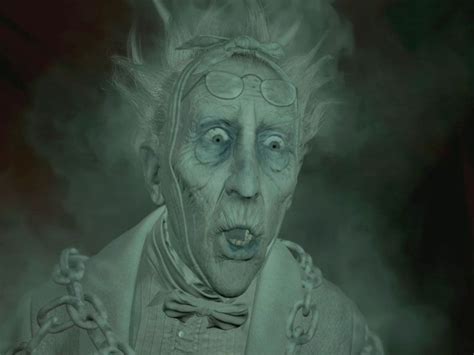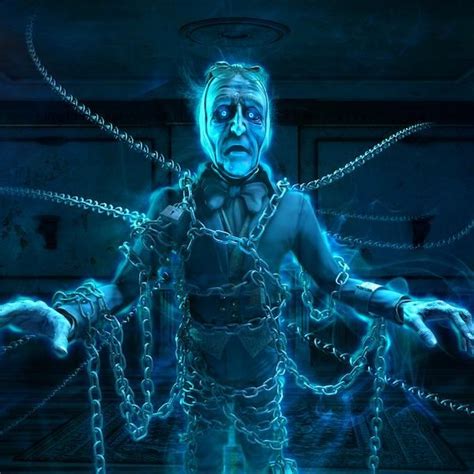The ghost of Jacob Marley, a pivotal character in Charles Dickens’ timeless novella, “A Christmas Carol.” Marley’s appearance in the story serves as a harbinger of the transformative journey that Ebenezer Scrooge is about to embark upon. As Scrooge’s deceased business partner, Marley’s visitation is a poignant reminder of the consequences of a life lived in pursuit of wealth and material possessions, without regard for the well-being of others.
Marley’s character is expertly woven into the narrative, his presence felt throughout the tale, even after his initial visitation. The weight of his chains, which he forged during his lifetime, serves as a powerful metaphor for the burdens that we accumulate when we prioritize our own interests above those of others. The clanking of these chains, a haunting sound that echoes throughout the story, is a constant reminder of the consequences of Marley’s actions, and the fate that awaits those who fail to learn from his mistakes.
As Marley’s ghost appearing to Scrooge, he is a terrifying figure, draped in the tattered remnants of his once-finest attire, his face deathly pale, with sunken eyes that seem to bore into the very soul of his former partner. And yet, despite the initial shock and fear that his appearance inspires, Marley’s presence is also a deeply sorrowful one. His lamentations, as he recounts the errors of his ways, and the opportunities that he failed to seize during his lifetime, are a heart-wrenching reminder of the human cost of a life lived in isolation and selfishness.
Marley’s visitation serves as a catalyst for Scrooge’s transformation, a warning that he must change his ways, lest he suffer a similar fate. The ghost’s words, “Mankind was my business; the common welfare was my business; charity, mercy, forbearance, and benevolence were all my business,” are a powerful indictment of the priorities that Scrooge has heretofore pursued. As Marley’s ghost disappears into the darkness, leaving Scrooge to ponder the weight of his words, the stage is set for a journey of self-discovery, one that will take Scrooge to the very depths of his own soul, and back again, transformed, renewed, and rejuvenated.
The character of Jacob Marley serves as a masterclass in the art of storytelling, a testament to Dickens' skill as a writer, and his ability to craft characters that are at once both deeply human, and profoundly symbolic. Marley's presence in the narrative is a powerful reminder of the enduring power of literature to shape our perceptions, and to inspire us to become better versions of ourselves.
In many ways, Marley’s story serves as a cautionary tale, a reminder of the dangers of allowing our priorities to become distorted, and our values to become confused. His is a story of missed opportunities, and of the devastating consequences that can result when we fail to recognize the inherent value of human connection, and the importance of living a life that is guided by a sense of purpose, and of responsibility to others.
And yet, even in death, Marley’s character is not without a sense of hope, and of redemption. His warning to Scrooge, and his plea that he change his ways, is a testament to the enduring power of the human spirit, and to the possibility of transformation, and of personal growth. As we reflect on Marley’s character, and the role that he plays in the narrative of “A Christmas Carol,” we are reminded of the importance of living a life that is guided by a sense of compassion, and of empathy, and of the need to cultivate a deeper understanding of the world around us, and of our place within it.
The Historical Context of Marley's Character

To fully appreciate the significance of Marley’s character, it is essential to consider the historical context in which “A Christmas Carol” was written. Dickens’ novella was first published in 1843, a time of great social and economic change in Victorian England. The Industrial Revolution was in full swing, and the divide between the rich and the poor was growing increasingly wide. It was an era marked by great hardship, and great inequality, and one in which the vulnerable members of society were often forced to live in desperate circumstances.
Understanding the Social Context
- The Industrial Revolution had created a new class of wealthy industrialists, while also exacerbating poverty, and increasing social inequality.
- The poor were often forced to live in squalid conditions, with limited access to education, healthcare, and other basic necessities.
- The wealthy, on the other hand, were often more concerned with accumulating wealth, and maintaining their social status, than with addressing the needs of the poor.
Against this backdrop, Dickens’ portrayal of Marley’s character serves as a powerful commentary on the social ills of the time. Marley’s obsessive pursuit of wealth, and his disregard for the well-being of others, are a stark reminder of the dangers of allowing our priorities to become distorted, and our values to become confused. His character serves as a warning, a reminder of the need to cultivate a sense of compassion, and of empathy, and to recognize the inherent value of human connection.
The Psychological Insights of Marley’s Character
From a psychological perspective, Marley’s character offers a fascinating case study of the consequences of a life lived in isolation, and of the devastating effects of unchecked greed, and ambition. His obsessive pursuit of wealth, and his disregard for the well-being of others, are classic symptoms of a personality disorder, one that is characterized by a lack of empathy, and a tendency to prioritize one’s own needs above those of others.
The Psychology of Marley's Character
Insights into Human Psychology
Marley's character offers a unique glimpse into the human psyche, a reminder of the complexities, and nuances of human behavior.
The Dangers of Unchecked Ambition
His character also serves as a warning, a reminder of the dangers of allowing our ambitions to consume us, and of the devastating consequences that can result when we prioritize our own needs above those of others.
As we reflect on Marley’s character, and the role that he plays in the narrative of “A Christmas Carol,” we are reminded of the importance of cultivating a sense of self-awareness, and of recognizing the need to balance our own ambitions, and desires, with a sense of responsibility to others. His story serves as a powerful reminder of the enduring power of literature to shape our perceptions, and to inspire us to become better versions of ourselves.
What is the significance of Marley’s character in “A Christmas Carol”?
+Marley’s character serves as a warning to Scrooge, and to the reader, of the dangers of a life lived in pursuit of wealth, and material possessions, without regard for the well-being of others. His presence in the narrative is a powerful reminder of the consequences of our actions, and the need to cultivate a sense of compassion, and empathy.
What does Marley’s character reveal about the social context of Victorian England?
+Marley’s character serves as a commentary on the social ills of Victorian England, a time of great hardship, and inequality. His obsessive pursuit of wealth, and his disregard for the well-being of others, are a stark reminder of the dangers of allowing our priorities to become distorted, and our values to become confused.
What psychological insights does Marley’s character offer?
+Marley’s character offers a fascinating case study of the consequences of a life lived in isolation, and of the devastating effects of unchecked greed, and ambition. His obsessive pursuit of wealth, and his disregard for the well-being of others, are classic symptoms of a personality disorder, one that is characterized by a lack of empathy, and a tendency to prioritize one’s own needs above those of others.




